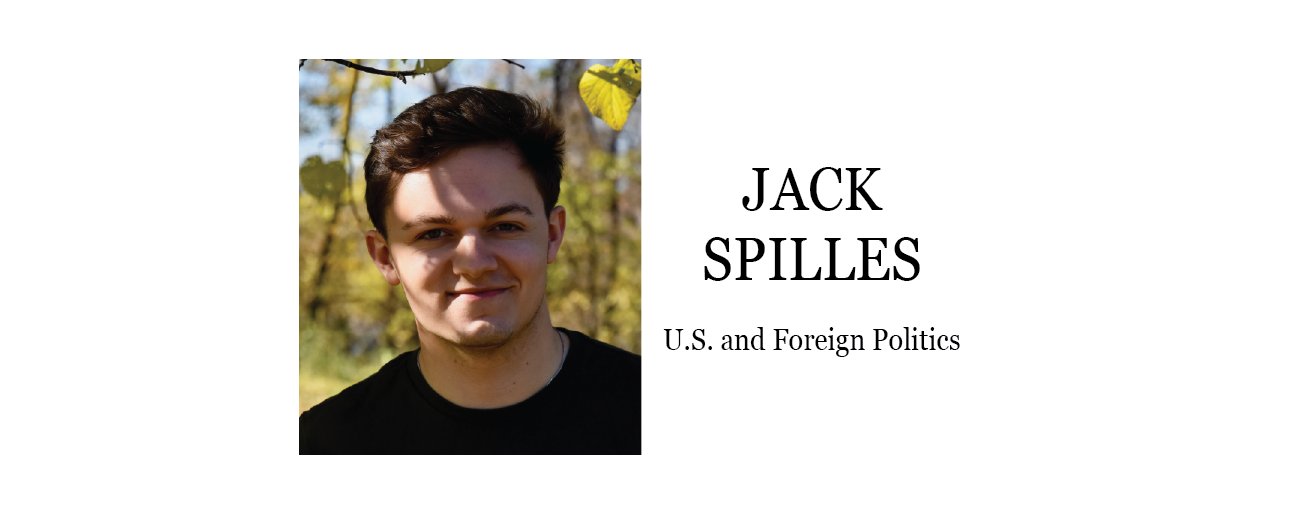In recent years, the political environment in the United States has become increasingly more contentious. For the last decade or so, growing hyperpartisanship has created larger divides between the two major American political parties; where once there was the potential for compromise on a range of issues, there now exists vast stores of vitriol and disdain. That contempt has been simmering for years, but the catalyst arrived in 2016 with the election of Donald Trump as President, which turned the dial all the way up to boiling. Where some saw a candidate to take on the “establishment” with no holds barred, others saw a man who exploited the economic and cultural worries of a demographic who felt threatened by change. Few times in U.S. political history has there been such a controversial and divisive elected official.
In his opinion piece last week, “SGA needs to do more for conservative students,” Garrett Leusink called the vandalization of a cutout of Trump a “deliberate attack against conservative students.” The graffiti, some of which read “leech” while another alluded to sexual assault, was directly addressed towards the figure of the president. Trump has, after all, profited off the U.S. government by using publicly-funded services without paying his fair share of taxes and been accused of sexual assault by over 25 women. It seems that these claims are not entirely unfounded. Perhaps, if someone is personally offended by these attacks on someone they support, they should engage in some introspection and ask themselves why it affects them so deeply; separating their own identity from that person or retracting support from them entirely may be in order.
The piece also complains that conservatives are not just overlooked, but completely disregarded and even demeaned on Concordia’s campus, that conservatives are “the students of campus who do not deserve to be respected or treated fairly because we think differently.” Examples include “worry about professors finding out you support Trump and retaliating against you, or students calling you a racist nazi.” To this, I say that if your worst fear or complaints about being on Concordia’s campus is that someone might call you a name or be mean to you, then you probably have it pretty good. Contrast that to the lives of the LGBTQ community, people of color and other marginalized groups in the U.S., especially under this administration, and hopefully you will gain some perspective.
People compare Trump to the Nazis because he condones white supremacists, attempts to undermine the legitimacy of democratic processes and incites hatred towards the “other,” most often the aforementioned demographics. Just this past month, at a rally in Duluth, MN, Trump aimed xenophobic attacks at Rep. Ilhan Omar and the Somali population in Minnesota, to raucous cheers from the audience. One of his first acts when in office was to try to ban Muslims from entering the country, calling for a “total and complete shutdown of Muslims entering the United States.” Not to mention the fact that for years, he was one of the biggest proponents of the birther conspiracy, a racist attack on the country’s first Black president.
The faux concern from the right over “civility” and “respect for opinions” is exactly that: false outrage designed to gaslight those on the left that hold strong convictions while ignoring those on their own side that act out in similar ways. Leusink writes “how about instead of making excuses SGA calls out the people that are actually being uncivil, the liberals.” How can these accusations be hurled at the left without even a mention of uncivil behavior from the right: the mailing of explosive devices to top Democrats, government officials and CNN headquarters; the foiled plan to kidnap Michigan Governor Gretchen Whitmer by 13 members of the right-wing “boogaloo” movement; and so many more examples, including the numerous smaller acts of violence and intimidation against Black Lives Matter protestors and eligible voters just in the past few months. Not to mention the fact that Trump has openly encouraged violence and intimidation against his opponents for years through his rhetoric. There may be examples of those on the left insulting or intimidating conservatives, and they should be condemned, but it is not a one-way street. If any uncivil acts are going to be called out, then all should be, including those on one’s own side, which I fail to see any examples of in this piece.
Finally, perhaps the most ridiculous sentiment in Leusink’s opinion reads “it’s time for the liberals to grow up and understand that their thoughts are not the only ones that exist, not only on this campus, but in the real world.” Those on the left are perfectly capable of engaging in civil discourse over differing views. Where we draw the line, however, is when those views attempt to discriminate against or strip rights from people. At that point, it is no longer a political opinion to debate over, it is a difference in how we believe people should be valued, and there is no reason we should tolerate oppression.

